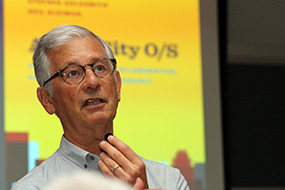Richard Paige — Some professors cast long shadows.
For author, noted prosecutor, and former Mayor of Indianapolis Stephen Goldsmith ’68, this influence is 50 years and counting.
“It was just amazing,” he says, speaking of a constitutional law class taught by Professor Philip Wilder, one Goldsmith says was his favorite.
“What I remember about constitutional law is there were two sides to every issue,” Stephen says. “There was a majority opinion and a minority opinion and both were very well reasoned. If you read one and you didn’t read the other, you would think that was inevitably correct. The way Phil Wilder taught that was amazing.”

Looking back a half century, Goldsmith remembers thinking of political philosophy and the questions that arose: what are we all about? What are we trying to do as a country? What did (John) Locke intend for us?
He then mentions a textbook that another professor, George Lipsky, used. It’s one Goldsmith still has on his bookshelf today.
“I underlined every other line in a different color,” Goldsmith explains. “Lipsky taught me how to think about threads of philosophy over time and their meanings. What does that mean with the great American experiment and what does it mean in today’s life?
“The combination of political theory with Lipsky and constitutional law with Wilder taught me how to think broadly and how to analyze.”
For a man set on public service when he arrived on campus, that was a welcome byproduct on the way to a degree.
“What Wabash did was taught me how to think and to apply that critical analysis to public policy,” Stephen says. “I didn’t learn politics at Wabash, I learned how to think about the policy.”